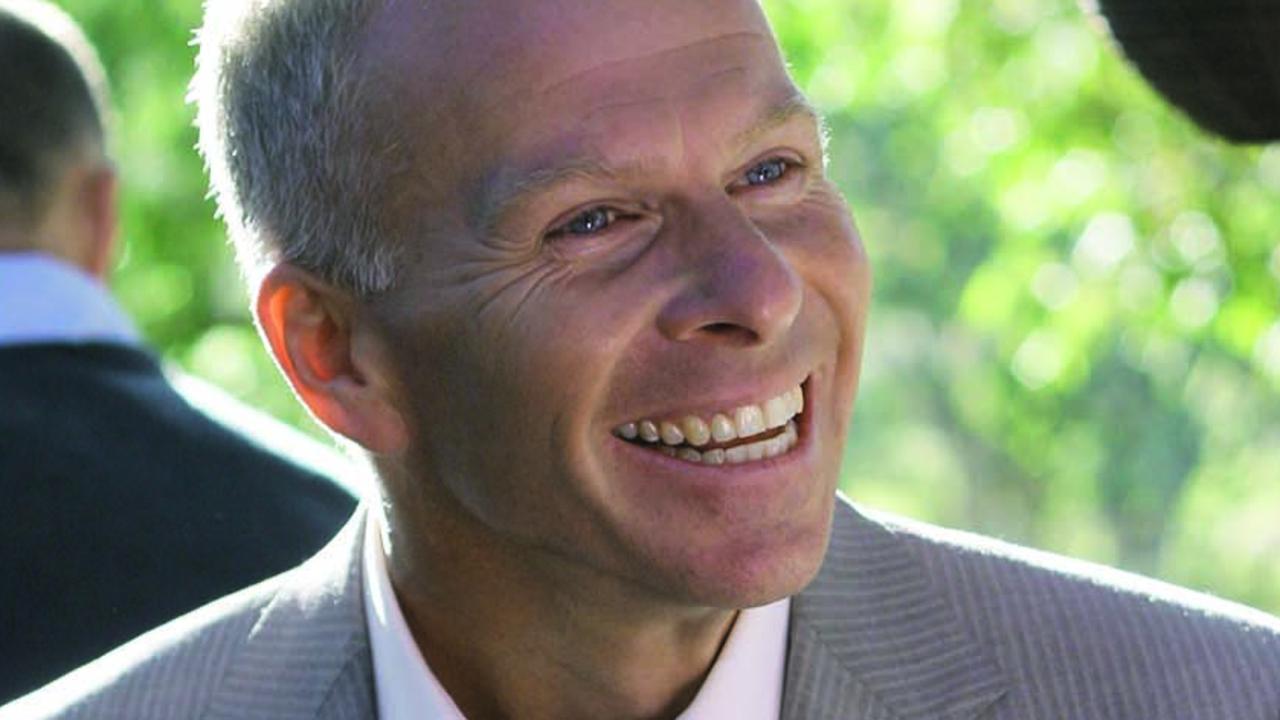Captain Dragan Vasiljkovic left high and dry
ON the run and accused of war crimes, Dragan Vasiljkovic was hardly in hiding.
AT Harwood slipyard on the Clarence River, on the NSW north coast, a 9m yacht sits deserted. The humming of welders' tools disturbs the weekday afternoon peace; a group of Tongan workers bound for Norfolk Island lounge in the late autumn sun.
In his 43 days on the run, this mid-north coast dry dock was the last place of refuge for fugitive Dragan Vasiljkovic, arrested by Australian Federal Police officers at dusk on Wednesday.
Workers at the slipway hadn't paid much attention to the silver-haired "Captain Dragan", also known as Daniel Snedden.
Bill Gleeson said hello "once or twice"; Ryan Brown would give a wave now and then while Vasiljkovic - a fugitive but hardly hiding - played with a black dog called Bingo.
"He would wave and say hello while he was doing repairs . . . I would never have guessed he was who he is," Brown says.
As the sun set on just another day on the dock on Wednesday, the friendly stranger was suddenly surrounded as a mysterious man pulled out his badge.
"All of a sudden . . . four or five cars show up with officers in bullet-proof vests and they had guns," says Gio Cervella, co-manager of the slipway.
Vasiljkovic is now in Sydney's Silverwater prison, his yacht the Salem II hoisted on the slips.
The accused war criminal must now face allegations that the Croatian government has levelled against him: that in June and July 1991, in a prison in the city of Knin in southern Croatia, Vasiljkovic tortured prisoners of war.
Croatia also alleges that during a military operation in Glina, in Croatia's south, Vasiljkovic led an attack by his paramilitary troops, the Kninjas or Red Berets, forcing the expulsion of civilians and killing several civilians.
The 55-year-old, who led a paramilitary command during the Balkans wars in the early 1990s, was revealed by The Australian in 2005 to be living in suburban Perth.
The story of how the AFP - which lost track of Vasiljkovic following a High Court hearing in Canberra in late March - came to collar the accused war criminal is unfolding piecemeal.
But it is unsurprising that the crucial piece of intelligence that led the AFP to the accused war criminal came from The Netherlands. The Serbian community has poured its energy into finding alternatives to the impending extradition of their national hero, Captain Dragan.
Vasiljkovic's team of supporters - including hotel chain owner George Bubalo, lawyer and friend Iliya Glisic and American wartime mate Steve Platter - hold deep reservations about the process that has brought Captain Dragan to this point.
Unprepared to accept what they saw as victor's justice, Vasiljkovic's supporters were desperately seeking an alternative to the seemingly inevitable outcome: extradition to Croatia to face old foes.
"If these really are breaches of the Geneva Conventions . . . all he is asking for is what he is entitled to under the Geneva Conventions, and that is a trial by jury and that should take place in an independent environment," Glisic told Focus last month.
The exact nature of the information Dutch police passed to the AFP is still unclear.
But according to Missouri-based Platter - who filmed documentaries during the Balkans conflict and became close to the man known as Kapetan Dragan - the activities of disbarred NSW barrister Bradley Slowgrove were of interest to police.
A worried Platter arrived at Sydney airport a month ago on what he says was a mercy mission motivated by concern from Vasiljkovic's mental health.
When he arrived at immigration, he became aware that his passport had been flagged by Australian immigration authorities.
"They wrote something on my Customs declaration . . . I was taken to a special line with no one in it," Platter tells The Australian by telephone from St Louis this week.
"The AFP were waiting on the outside. Customs took over at that point, emptied by bag, X-rayed my clothing, took my computer, took the lining out of my suitcase."
Platter's mobile telephone, credit cards and driver's licence were also seized.
"The AFP then just waited for me to get out of Customs and then I talked to them," he says.
"The first interview was over coffee at the airport for 1 1/2hours, then they drove me to a location where I was staying."
Platter says he had two or three conversation with AFP officers during the course of his week-long visit in Sydney.
"They were on me constantly," he says.
Of particular interest to the AFP was his relationship with Slowgrove, who represented Vasiljkovic during his first extradition challenge in the NSW magistrates court. His conduct in that matter came at a heavy expense to his career.
Slowgrove was disbarred after a he sent a letter to NSW magistrate Allan Moore that - according to a judgment of the NSW Administrative Appeals Tribunal - "threatened severe personal consequences" if Moore did not disqualify himself from hearing the case.
"They asked me if I knew [Slowgrove] and I said yeah," Platter tells Focus.
"And they said when we telephoned him he was in Holland. They told me that he was answering their initial phone calls from that country.
"And in final questioning [they said]: 'What would [Vasiljkovic] feel if he could go to The Hague.' And I said: 'He would turn himself in.' "
The Dutch National Prosecutor's office has said it was contacted last week by the AFP, which was suspicious that Vasiljkovic might have fled to The Netherlands. But after a week of investigations, it was determined that Vasiljkovic was still in Australia.
An Interpol warrant for Vasiljkovic's arrest was current.
The Netherlands is a member country of Interpol.
Sydney's Serbian community believes Slowgrove - who also has lectured in international law among other subjects at a Sydney university - is in The Netherlands. Focus has not been able to contact Slowgrove, whose home phone is disconnected and whose mobile telephone goes straight to voicemail.
Whatever attempts took place to broker a deal at The Hague - if any - Vasiljkovic would face an almost impossible task gaining access to international courts.
According to legal experts, a hearing for Vasiljkovic in the International Criminal Court or the International Criminal Tribunal for the former Yugoslavia is impossible.
The ICC does not have jurisdiction to prosecute crimes allegedly committed before June 2002, says Mark Ierace, a NSW barrister and former deputy prosecutor to the ICTY.
And the ICTY announced in 2004 that it would issue no further indictments.
One of the investigators involved in the prosecution of Slobodan Milosevic - in which Vasiljkovic gave evidence for the prosecution - said the former paramilitary commander would be laughed out of The Hague if he attempted to cut any kind of deal there.
"He turned hostile witness," former NSW homicide detective John Ralston says of Vasiljkovic's 2003 testimony before the ICTY, in which Captain Dragan referred to Milosevic as "Mr President" and radically changed his testimony following an overnight telephone call with his former wartime ally, secret police boss Franko Simatovic.
Ierace says Vasiljkovic would be treated with caution by prosecutors. "He would have very little credibility in the eyes of the prosecution given what happened in the Milosevic case," Ierace says.
"He turned around and accused investigators of fabricating a statement. And I have to say it was a very odd decision to have called him in the first place."
As the hefty paperwork involved in extradition cases begins to be shuffled in Canberra, there is one woman who hopes the Australian legal saga does not drag on much longer.
Christiane Schlotzer, a German journalist and the widow of fellow reporter Egon Scotland, is still waiting for justice for her husband 19 years after his death at Glina, during Vasiljkovic's most famous command.
Scotland bled to death after being shot by a sniper's bullet while travelling in a car with other reporters near Glina during an ambush by Vasiljkovic's army in July 1991.
Scotland is named as a civilian victim in Croatian prosecutors' arrest warrant against Vasiljkovic.
"There were many years that I did not believe that he would ever be caught," Schlotzer told Focus from Greece yesterday.
"Many of my friends who were friends of Egon, they always ask me what happened to this guy [Vasiljkovic].
"I am very much satisfied with the Australian authorities that finally they found him. I hope he stands trial in Croatia soon."


